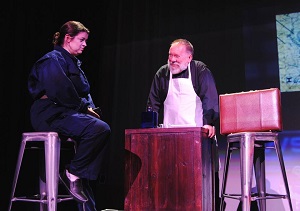I’ve tried to avoid reading too much or listening to too many interviews about the album so that I could form an opinion based on the work and my U2 knowledge alone without having my thoughts being influenced by the words of others.
Therefore, what follows is merely my interpretation and impressions from listening to Songs of Experience armed with nothing more than the lyrics book, the liner song credits (I didn’t read the explanations), and my past knowledge of U2.
It’s obvious that the title is at very least a nod to poet William Blake, who penned Songs of Innocence and Songs of Experience, two poetry collections published first in 1789 and 1794, respectively, then later bound and published together as Songs of Innocence and Experience. Like Blake’s poems, U2’s Songs of Innocence and Experience refer to one another.
Three of the Songs of Experience directly bite from the corresponding album: "13 (There is a Light)" seems almost to be a reprise from the earlier "Song for Someone." The song does become more reflective and looks inward, a theme that seems to run through this new album. It’s as if, in seeking to write legacy songs to leave for the future, Bono seems to be penning lyrics to the past.
"Lights of Home" uses the bridge from "Iris," an interesting choice since the Innocence song is about Bono’s deceased mother and the Experience song seems to be about the “rebirth” he experienced after his near-fatal bike accident in November of 2014 - which came four days after the jet on which he was traveling lost a rear door - (“I shouldn’t be here ‘cause I should be dead”) *a moment of silence for thanks to whomsoever spared him*
"American Soul" takes directly from "Volcano" in both lyrics and music, with maybe a little throwback to "Get On Your Boots" with the drum roll transitions and perhaps a soupçon of "Vertigo" in the guitar.
"Red Flag Day" is perhaps the most subtle reference to one of the Songs of Innocence, touching on the subject of breaking waves, corresponding to "Every Breaking Wave."
The band has lost none of its political fervor, as clearly evinced on "Red Flag Day." It starts off as a possible love song, but the bridge of the song brings to mind vivid pictures of Aylan Kurdi, the 3-year-old Syrian boy whose body washed ashore when his family was trying to escape Syria. But the striking line, “Not even news today, so many lost to the sea last night,” makes it hit even harder. That child was the one we heard about, but the many Syrian refugees (and refugees of all kinds) that are lost to the sea trying to find sanctuary don’t even make the radar. And there is an ironic criticism in the following line, “One word that the sea can’t say is ‘no’” – referring, it seems, to the many countries, the United States in particular, who did say “NO” to these people.
Upon first listen, "Red Flag Day" stood out as the superior song, infectious and riveting. Vocally, Bono soars on this track; Adam’s bassline carries the verses and Larry’s drums dominate the chorus, and Edge’s backing vocals – I’m always astounded by the beauty of his voice – are the final piece that make this song perfect.
From the first note, "The Little Things That Give You Away" gives itself away – it is a song so poignant that it sounds like a punch to the heart. It’s an ode to every one-sided relationship, where the other half just stops listening and communication ceases (“the words you cannot say / Your big mouth in the way”). It’s the point in life where you finally have to admit when something is over and let go.
The second half of the song seems to be explaining the “why”; from “sometimes,” the lyrics take on a more introspective and personal bent, describing the personal struggle that everyone experiences at least once in their life – anxiety, doubt, fear, grief. (“Sometimes, I’m full of anger and grieving / So far away from believing / That any sun will reappear”) Between Innocence and Experience, both The Edge and Larry lost their fathers – Larry’s father passed away days before the Innocence + Experience Tour was to begin in 2015. No doubt these losses brought back memories of Bono’s own father, whose loss inspired “Sometimes You Can’t Make it On Your Own.”
Sonically, the song opens with Larry’s slow drum beat. When the “sometimes” part begins, the piano comes in and then Edge’s rapid-fire guitar and Larry’s drums combine to give this song a slow crescendo of fast notes ending in a plaintive word and sorrowful piano note.
Any speculation as to Bono’s vocal abilities or any decline thereof are assuaged on that and the following track: “Landlady” is clearly a sort of love letter to Ali – and, as an extension, I’m sure, to all the U2 wives – for holding down the fort while he / they are on the road. “Landlady” sonically hearkens back and offers a touch of the feeling from The Unforgettable Fire’s “Promenade” – just a sense of ascending. I love the line, “I’ll never know, never know what starving poets meant / ‘Cause when I was broke, it was you who always paid the rent.” There’s a hint of Sinatra in the vocals as well.
"Summer of Love" is a funky little number that floats along entirely on Adam’s bass track, and the shaker sashay and Edge’s exotic flamenco-sounding guitar calls up a sense of summer while slipping in a little dark material. Lady Gaga provides some backing vocals on this airy delight.
"The Showman (Little More Better)" is a rather fun, tongue-in-cheek song with Bono calling himself (presumably) out as a caricature. I feel like it hearkens back to the days when he became The Fly – “I lie for a living, I love to let on / But you make it true when you sing along.” It sounds like a reference to the whole megalomania circus that was The Zoo Tour, and how Bono pretending to be a huge rock star sort of re-launched U2 as a huge rock band.
"You’re the Best Thing About Me," released as the first single, is a another classic example of U2’s playfulness. It’s unclear whether its meant to be about his wife or his children, but maybe it’s both. Again, he seems to address himself at the end (“I can see you love her loudly / when she needs you quietly”). The biggest standout to me is the powerhouse of drums.
Originally, the Auto-Tune on "Love is All We Have Left" grated on my nerves, but after a few listens it became less intrusive and, thematically, it’s a very apt song to open this collection.
"Get Out Of Your Own Way" segues into "American Soul" with Kendrick Lamar reciting the gospel according to U2, and while the songs can both be interpreted to be advice given from one person to another (or to himself) they are clearly also dedicated to the American people and in direct criticism of the current political regime. The same goes for “The Blackout,” and this time when Bono references a “big mouth,” we know it’s not his own he’s referring to. "American Soul" puts on display the hypocrisy of the politicians that claim America is a Christian nation with the witty line: “A country to receive us / Will you be our sanctuary / Refu-Jesus”?
“The Blackout,” despite being a politically-charged song about the end of the world (“Is this an extinction event we see?”) is sonically a proper party dance song with its Achtung-Baby reminiscent guitars and funky bass. The chorus is an amazing thrash-about time that is the signature move of Jacknife Lee, who produced this track and about half of the album. U2 has become very schooled over the years in cutting the sour with the sweet.
Gracing the album cover is Bono’s elder son and Edge’s youngest daughter, and presumably Songs of Experience was intended to pass on advice from a place of experience to the younger generation. In “Love is Bigger Than Anything In Its Way,” while it certainly sounds like it could be fatherly advice, the lyrics read like a letter to Bono’s younger self (“So young to be the words of your own song / I know the rage in you is strong / Write a world where we can belong / To each other and sing it like no other”). So much of U2’s earliest work was full of indignation and outrage. Their work still expresses their discontent with the atrocities of the world, but they have learned to express it more artfully. The anger is still there, but it’s been channeled in a nonviolent fashion.
** from the deluxe album**
Recalling the sound from The Joshua Tree era, the very personal "Book Of Your Heart" which addresses the marital bond, ends with a universal thought: “Love is what we choose to do.” Although on the surface, it could be speaking to love being a verb rather than a noun: the notion that a couple needs to actively work to remain together. But on the whole of the album, it has the implication that our actions create love in this world; we just have to choose the right ones.




















